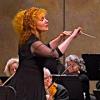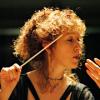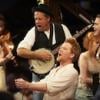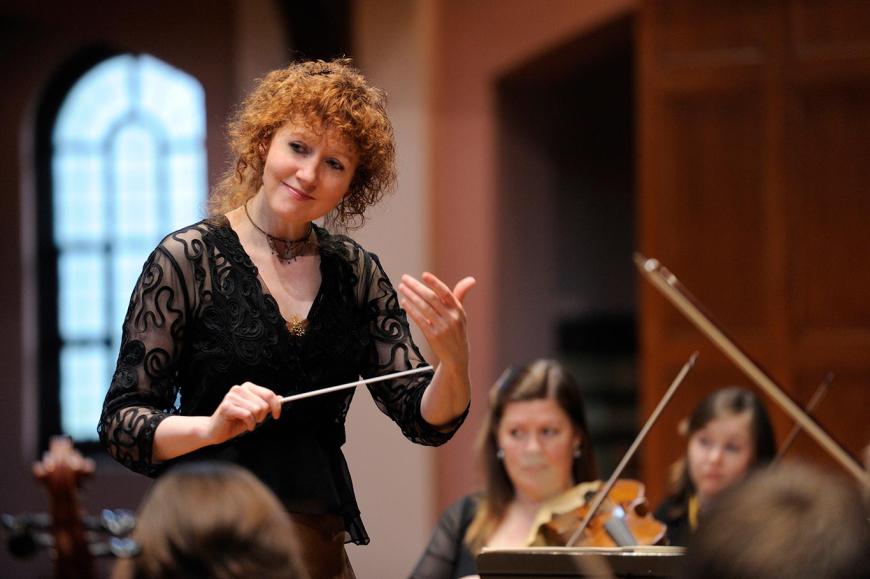
Conductor and harpsichordist Jeannette Sorrell was born in San Francisco and grew up in Denver. In high school, Sorrell played piano but realized her hands were too narrow for her to be a concert pianist. She loved playing with other people, and her natural ability at leading a group of musicians asserted itself when she was a teenager and started taking conducting classes.
When Sorrell auditioned at Juilliard, a professor told her to find a new profession because audiences wouldn’t accept a woman conductor. Since, Sorrell has conducted around the world, including with the New York Philharmonic and the Royal Liverpool Philharmonic and at Carnegie Hall and the Teatro Real in Madrid. Apollo’s Fire, the Baroque orchestra she founded in Cleveland in 1992, has released 30 commercial CDs, 11 of them bestsellers on the Billboard classical chart, and the group won a Grammy in 2019. So, it seems audiences have accepted her just fine.
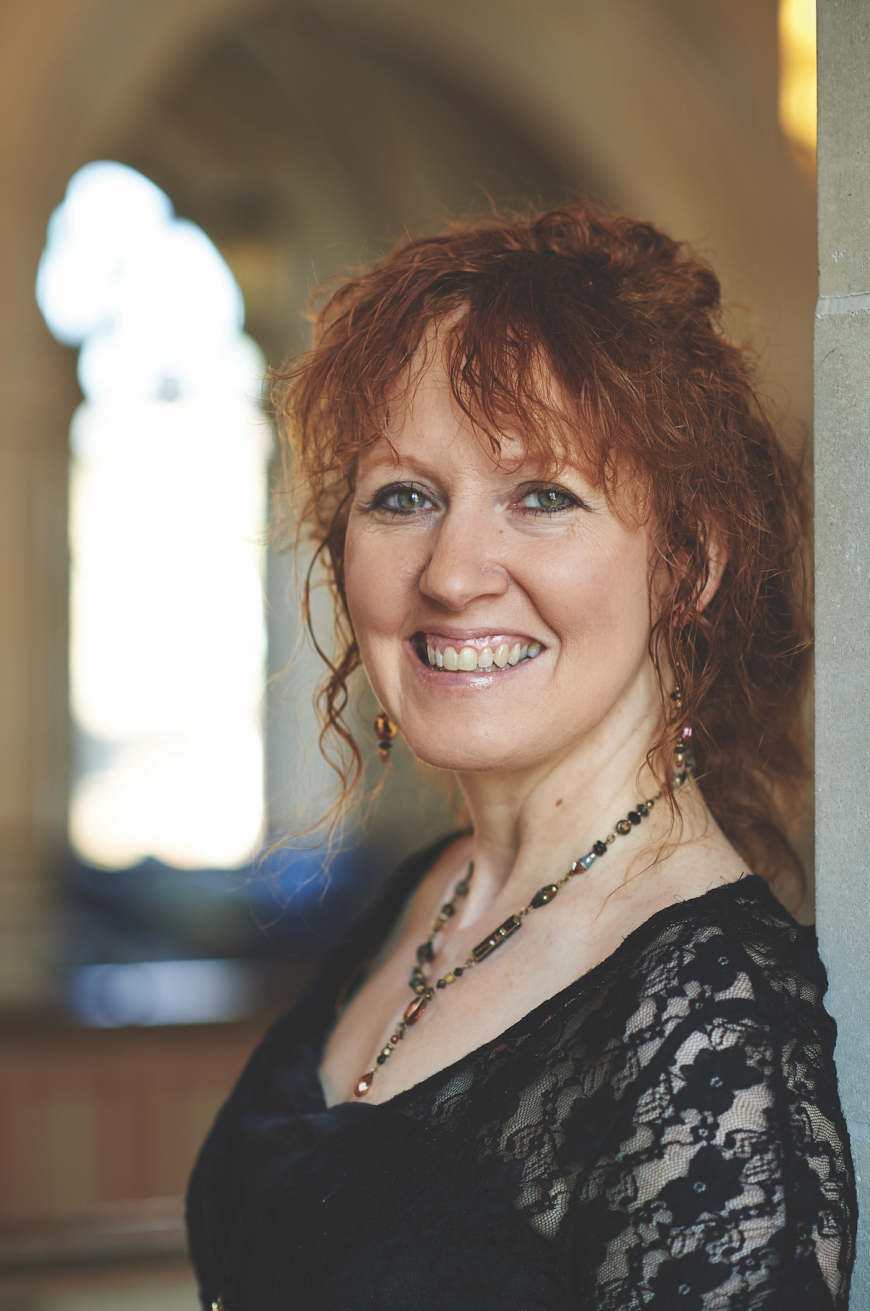
Along with classical music, Sorrell and Apollo’s Fire have expanded into Appalachian, Celtic, and Sephardic songs and music. March 15–17, she is returning to the Bay Area, leading the Philharmonia Baroque Orchestra in “Diaspora: Jewish Music of Longing & Celebration.”
Why the name Apollo’s Fire?
As you know, Apollo was the classical Greek god of music and healing, and I think it’s fascinating that the ancient Greeks put music and healing together on the same deity. They clearly knew that music has the power to feed the spirit, and that is really what we try to do in our concerts.
Apollo also carries the sun across the sky with his golden chariot. The fire part refers to that side of Apollo but perhaps also to the way that we sometimes play. Our group plays with a lot of energy.
You play Baroque music and other classical music, including Mozart. But this concert you have coming up in San Francisco and Stanford is “Diaspora: Jewish Music of Longing & Celebration.”
We’ve been playing multicultural programs for quite a few years. In the early Baroque period, like the end of the Renaissance, there wasn’t such a wall between serious art music and folk music. They were much more related to each other. We began exploring that sort of gray area between our “composed” music and folk music probably 20 years ago. And we’ve done a number of programs of traditional historic Celtic music and Appalachian music and Jewish music. Our first Jewish project was called “Sephardic Journey,” and that became a CD album that did really well. Then there was another one called “O Jerusalem!” So, this one is really the third of these Jewish programs. I feel that the theme of as exile and migration is really timely because of everything going on in the world. The United Nations says that we have more migrants and refugees on the planet now than ever before in recorded history.
What is it that you particularly like about playing this music?
It’s very soulful and expressive. And then, it also has really fun, lively songs like klezmer. Everybody’s heard of klezmer music, but some people don’t realize what it really is. It was music to be danced at Yiddish weddings in Eastern Europe, and it’s very celebratory. There’s just a lot of fun and energy and a sense of a communal gathering. What I’ve seen when we’ve done these programs before is that it really helps the live audience to feel connected to each other and you feel a sense of community.
You’re doing a talk with PBO’s Jews & Music scholar-in-residence Francesco Spagnolo about roots and music. What will you be talking about?
I think one of the topics is my own personal connection to this music. I pretty recently discovered that my father — we knew that he had left his home in Europe and come to the U.S. before I was born, but his real story was shrouded in secrecy. We had no idea that he was Jewish and that his whole family had some very shocking experiences in World War II. Discovering all of that and discovering that I’m half Jewish, which I didn’t know until pretty recently, has really helped me to, I think, tap into this music in a different way. In this concert, we’re sort of telling the story of the exile experience, but in a sense, it is the echo of my dad’s experience as well.
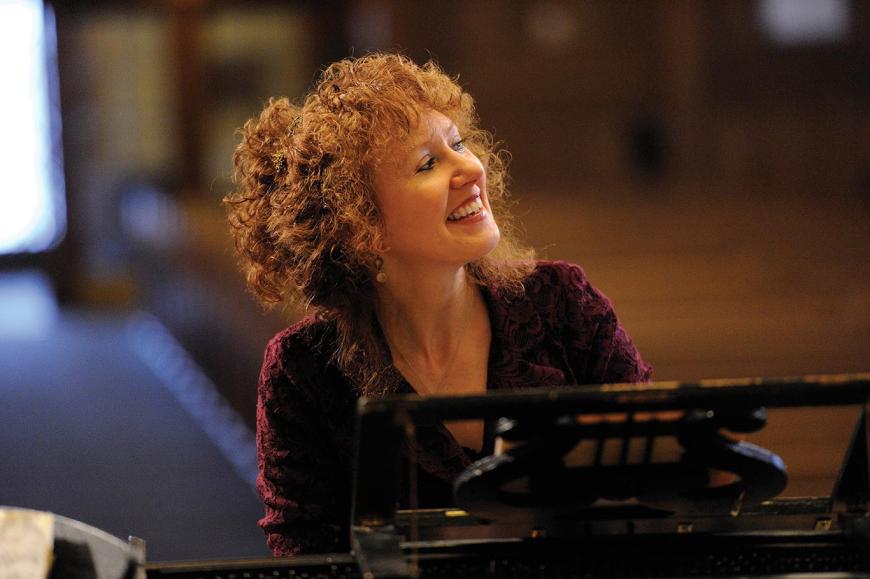
Reviews often describe you as a great storyteller. How do you tell a story with music?
When I plan a concert program, I really think a lot about the series of moods that we’re creating and try to build an emotional arc that takes people on a journey with a sense of drama and theatrical engagement. Whether or not there’s any theatrical lighting or any props or anything, we can still on an emotional level take a dramatic approach to the concert experience. A lot of my programs try to take people on some kind of a journey like that, and I often use a little bit of spoken narration here and there and sometimes a few poems. There’s a couple of poetic recitations in this concert with sometimes just some plucked-instrument sounds underneath to create the mood.
Also, as much as possible, I try to put the audience inside of the concert. In other words, the musicians are not only on the stage; they are sometimes processing through the aisle or singing out with the audience and things like that. I try to use the space in unexpected ways.
How did you end up a conductor?
I grew up as a pianist, and I loved the piano. But it was also clear, because of my hands, that I was not going to be a concert pianist. In any case, I didn’t really like playing alone very much. I much preferred playing with people. In fact, when I was about 15, I started an instrumental and vocal ensemble at my church just for fun. I was the director of it and leading it from the keyboard, not with any intention of pursuing a career, but it was just, “This is something fun to do.”
I think I fell into conducting very organically. Then I started taking actual conducting lessons when I was 16 or 17.
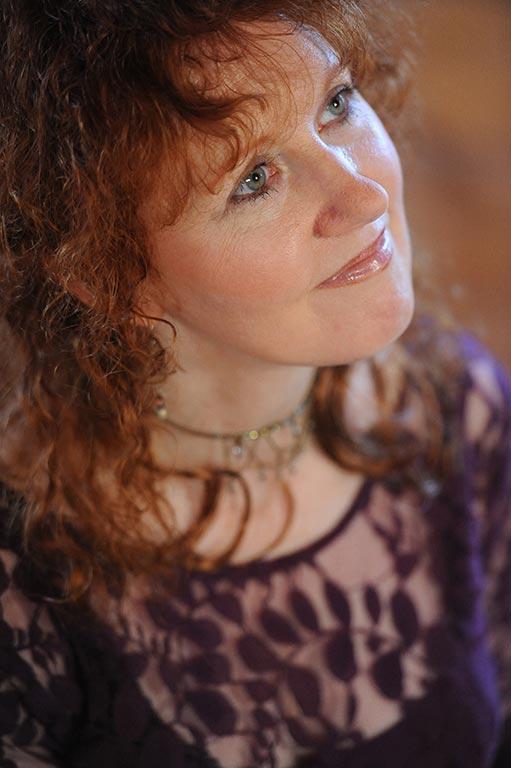
What do you think makes you a good conductor?
Maybe two things. I think what musicians usually need and want from a conductor is a really strong musical conception of “How are we going to play this piece?” I’ve always tended to gravitate toward being an interpreter of scores, and that part comes easily to me, of having an imagination of how you want the music to sound.
Then I think the other part of it is because of my background in early music and chamber music. I probably am more collaborative with orchestras than your typical orchestra conductor.
How did you get interested in Baroque and period instruments?
When I was in high school, recordings were starting to come out from Europe with Mozart on period instruments. I was listening to these, and I just immediately fell in love with the sound of period instruments — the gut strings, which are so gentle and sweet, and the chirpy woodwinds and things like that. I really love the sound, and I also have always been fascinated with history. So those two things came together for me already when I was 17 or so. At that point, I knew that my dream was to direct a period-instrument chamber orchestra. But it was just like a dream. It wasn’t something that I thought would ever happen.
When you were auditioning to conduct at Juilliard, some students told you they liked playing with you. Then the teacher told you to find a different profession because no one would accept a woman as a conductor. I was a little baffled by that, and I wondered about your reaction.
I was shocked and baffled too because I had been raised by my parents to believe that I could do anything I wanted if I put my mind to it and persevered. So being told by this older German professor that I couldn’t be a conductor — I think what he said was that it wasn’t going to work because orchestra musicians didn’t want to play for a woman. As you noticed, he said this right after his own musicians at Juilliard were coming up to me and saying they liked playing for me. I was stunned by it, but I didn’t believe it for a moment. I didn’t even question. I just figured I’m going to have to find a different path then.
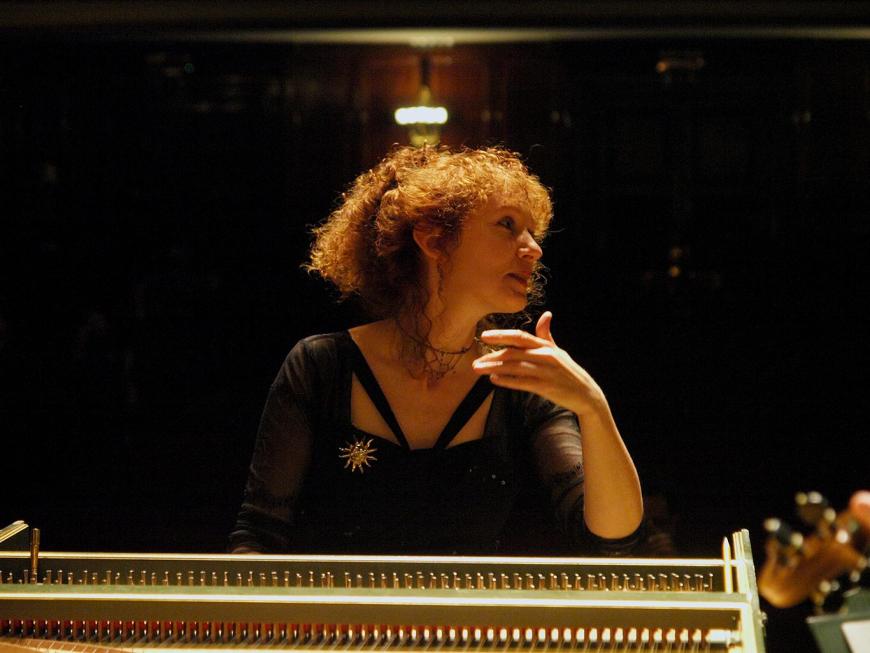
How was it when you started Apollo’s Fire?
I had no idea that it was going to end up being successful. It was just kind of like a project, like, “Let’s try this and see if it survives for a year or two,” and I thought that it probably wouldn’t. A period-instrument orchestra is an expensive thing, and there are not very many cities in the United States that have enough period-instrument specialists. In Cleveland, we’ve always had to fly about half of them in. Apollo’s Fire is a handpicked pool of musicians from all over the Eastern U.S. and Canada and occasionally Europe. In a way, that’s been a kind of blessing because it enabled us to put the group at a quite high level from the beginning. We’ve always had our pick of musicians from all over the Eastern U.S. For example, the musicians that will be playing in these concerts — our concertmaster lives half the time in Cleveland and half the time in Singapore. Then our principal second violinist lives in Chicago, but she’s Japanese. Our hammer dulcimer player is amazing, and she lives in the Cleveland area, but she’s probably the best hammer dulcimer player in the country. Then we’re bringing an Israeli recorder player and two Yiddish music specialists from the U.K.
Is it fun to have this group you dreamed about?
It is really fun, and I think to be on tour and have this feeling that we’re going to go up there onstage and play this music that we love and know really well for a new audience that is hearing it for the first time — it’s a chance to entice them to fall in love with Baroque music. We only have this one chance when you’re on tour, so it’s just like a really fun challenge.
Audiences don’t realize that they are half of the concert experience because the way that they respond and engage totally affects the rest of the performance. You know, the mood of the concert and the pacing and the energy are all going to depend on how the audience responds.
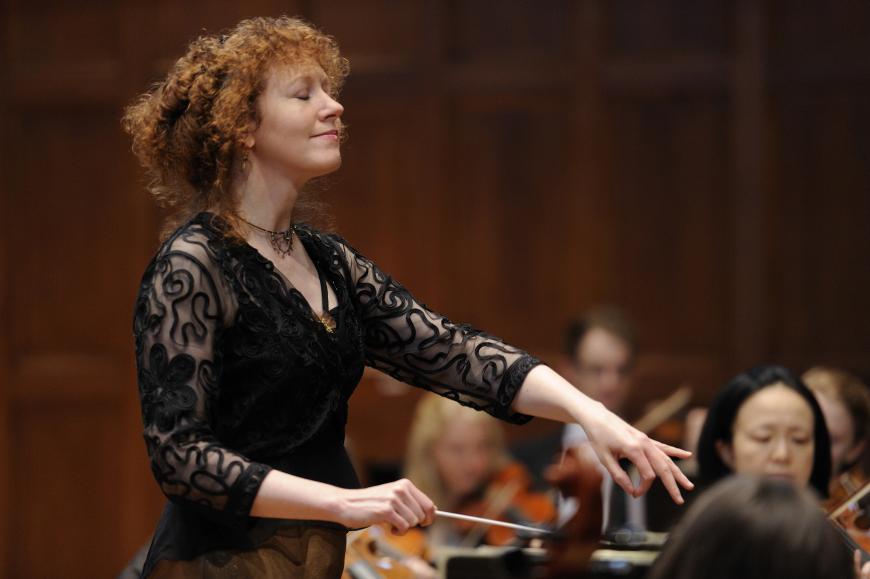
Why do you think Apollo’s Fire has been so successful?
I do think that Baroque music, if you take it back to how it was meant to be played at the time, which is with a great deal of emotion and drama and what’s technically called rhetoric, if you take it back to those roots that it had when it was fresh, I think that it really speaks to people from all walks of life. You don’t need to have a Ph.D. or a bachelor’s degree to love hearing this music. This is, I think, why we have almost 13 million views of our videos now because it’s just music that speaks to the heart and helps people feel connected and helps people tap into their different emotional moods.
Is there anything you would like to add?
I guess the only other thing is that the thing audiences say to us the most often is they absolutely love watching the interactions between musicians because our musicians are quite animated onstage. It’s quite a visual experience to come to a concert like this.


